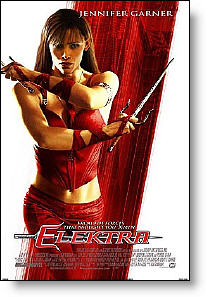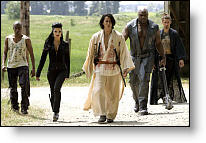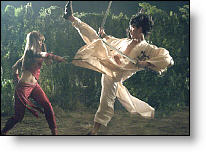Elektra
 for action violence.
for action violence.
Reviewed by: Keith Howland
CONTRIBUTOR
| Moral Rating: | Average |
| Moviemaking Quality: |
|
| Primary Audience: | Adults Teens |
| Genre: | Fantasy Crime Action Adventure |
| Length: | 1 hr. 37 min. |
| Year of Release: | 2005 |
| USA Release: |
January 14, 2005 |







Discover God’s promise for all people—told beautifully and clearly from the beginning. Discover The HOPE! Watch it on Christian Answers—full-length motion picture.
| Featuring |
|---|
| Jennifer Garner, Goran Visnjic, Terence Stamp, Jason Isaacs, Will Yun Lee |
| Director |
|
Rob Bowman |
| Producer |
|
Mark Steven Johnson Gary Foster Avi Arad |
| Distributor |
Elektra is a sort of sequel to last year’s DareDevil [read review], which featured Elektra as a minor character out for revenge against a colorful villain. As in the Marvel comic books that inspired it, Elektra was killed in her pursuit. (She was impaled through her exposed midriff, which raises the nagging question of why female superhero-types always seem to be dressed so vulnerably. Of course, we know the answer, but they do seem to eschew the compulsion of their male counterparts to completely conceal themselves. DareDevil, for instance, exposes only his chin to the world, whereas Spider-Man covers up even that!)
In comic books, death is rarely an obstacle. So Elektra returns to life for her own comic book series and now her own movie. The film eventually reveals who restores her to life, and (sort of) how he does it, but there is little compelling motive for it, except that if she did not live again there would be no story. Especially strange is that the vocation Elektra adopts for her second life is that of a contract killer!
After an opening scene establishing Elektra’s somewhat ill-defined, but fearsome abilities at her job, the film introduces the pivotal conundrum that will serve to validate her second chance at life: She is contracted to kill a father and daughter whom she does not want to kill, so she opts instead to defend them. This is no small task, as a nasty Asian conglomerate called “The Hand” is after “The Treasure” that this father and daughter have something to do with. So Elektra seeks the help of her erstwhile blind martial arts instructor and aphorism-spouting guru, Stick, and his band of devotees.
To say anything more of the plot may give too much away, since there is so little to it, but what follows mostly involves a slew of nefarious villains whose abilities appear to far exceed Elektra’s, and yet against whom she manages to prevail anyway. (Why she does, when she previously met her death at the hand of just one villain with lesser ability is one of many, many brain-busters in the film.)
Shakespeare would likely call Elektra a tale “full of sound and fury, signifying nothing.” The filmmakers may protest that their story is rife with significance, but the characters and dialog are so insipid, the plot so thin and inconsistent, and the presentation so murky that any attempt at profundity is lost. The clear selling point is watching Jennifer Garner (star of spy-thriller TV series “Alias”) engage in lots of sparring with all sorts of nasty Ninja-types. If that is your craving, then perhaps you will not look at your watch too often during the film.
Amidst the muddled mayhem there is some attempt at philosophical reflection, even though no character has depth exceeding those in a television commercial. (Elektra is so bland it is difficult to have any feelings for her, although poor Ms. Garner is hardly to blame for the meager script. Of course, when the protagonist is so poorly realized, the supporting characters have no hope.)
Elektra’s predominant power is something called Kimagurie, which is seeing what is going to happen before it happens. In her case, this ability is fairly limited (she does not know a house she is in will be surrounded by thugs until it actually is), but its mastery is related to “inner stillness”-a concept much like what is found in Buddhism, Confucianism, and the other Eastern philosophical religions. As such, the film mentions nothing related to deity, although it contradictorily talks of an age-old struggle between good and evil, which is a concept alien to Eastern religions, which posit that reality is an illusion. By contrast, the Bible tells us that God created the universe of reality, and that it was good (Genesis 1-2), but that evil entered the world through Satan (Genesis 3), and mankind’s continual struggle with sin and evil continues throughout history, until at last Christ will return to conquer evil forever, casting Satan and all his minions into the lake of fire (Revelation 20).
If the film has a theme (apart from slamming evil), it is second chances. At one point a character muses that Elektra is defending the lives of those she was meant to kill as penance for what she had done before. Elektra’s mentor, Stick (played by Terence Stamp) later tells her that “I always knew your heart was pure; you just needed to see it for yourself.” In the world that God created (not the one fashioned by Marvel Comics and Twentieth-Century Fox), there is a way for all people to have a second chance. But it is not personal penance, or discovering the inherent goodness in oneself. The Bible says that every person (except Jesus Christ) is born a sinner, ever since Adam and Eve defied God in the Garden of Eden.
Q & A
We are incapable of making ourselves good, because there is no good to be found in us (Romans 3:23; Isaiah 64:6; Psalm 53:3; Genesis 8:21). We deserve the fate that awaits Satan and his minions at the end of history. But God in his great mercy sent Jesus Christ-the one sinless man and God incarnate-who took upon Himself the fate we deserve in His death on the cross and rose again to new life so that we too might have new life.
We acquire this new life by repenting of our sin and trusting Jesus as our Savior, so that through Him God will forgive our sins and grant us eternal life (Romans 5:18; John 3:16, 11:25-26; Romans 6:23; I Corinthians 15:22; etc.).
What a contrast is Christ’s resurrection from the dead to Elektra’s! His means life for all who believe, whereas hers was nearly meaningless. In a way, Elektra does repent of her sin because she does turn from her life of killing (“repent” means “to turn back”), but she then attempts to be good on her own ability, which is impossible in real life. Only Christ restores people to godliness (John 14:6, etc.).

Elektra is full of violence, mostly of hand-to-hand, Ninja-type hurly-burly. There is actually very little blood, though, as most of the punch of the pummeling is established by sound effects. There is a smattering of profane language, too, and of course repeated scenes of our hero clad in what often seems less than a full costume, especially in the beginning and end of the film when she wears her famous red Elektra outfit.
At the end of the film, Elektra says to Stick, “Your second life is never really as good as your first, is it?” He replies, “Sometimes it’s even better.” This is the nearest the film gets to profound truth and to real life. For all those who believe in Christ as their Savior and Lord, the second life is eternally better (see Revelation 21). That is a hope far greater than anything this trying film offers its cardboard characters.
Violence: Heavy / Profanity: Moderate / Sex/Nudity: Mild

Read our review of the 2003 prequel to this film, DAREDEVIL.


Average/2
Then the evil bad guys proceeded to meditate and use some form of power to transform their bodies into animals.You could just feel the evil through the screen. It was then that I had just enough. I looked over to my children and said close your eyes, this movie is evil. Then my oldest son said to me, “Mom, let’s go!” I could see the discomfort in his eyes.
As soon as we left there we prayed and asked for forgiveness. You could just feel the evil coming from this show. This film was very alarming and full of the devil! I was very disappointed to see this promising young actress play in this film. As a Christian, I would not recommend this movie to anyone at all.
Very Offensive/1
Although our children are adult and have children of their own, I wonder just how confusing this material is to our young people that might view it? I also feel that it promotes religions other then Christianity which can only confuse.
My wife and I would certainly not recommend renting this movie to anyone, especially fellow Christians.
Extremely Offensive/1
Better than Average/4
Average/2½
Though no doubt some serious money was spent on special effects, I would rather have had average effects and a decent script. When it comes to movie quality, this is a 3/10 in my book. Now… on to the religious standpoint. Nothing Christian or anti-Christian in this movie. It has violence, some foul language, and while Elektra’s costume is somewhat questionable, it obviously isn’t that bad since the movie got a PG-13 rating.
I couldn’t recommend this movie to a person who judges movies solely on religious content, but I couldn’t say anything against it either. My advice is you stay away from this, not because of objectionable content, but because of some of the most abysmal movie making I have ever seen.
Average/1½
Better than Average/2
Better than Average/5
Better than Average/5
PLEASE share your observations and insights to be posted here.



My Ratings: Better than Average/5